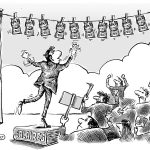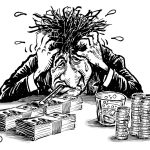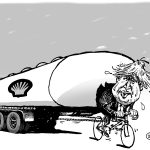A “menage à trois”
More than ever in a position of strength at the end of the first phase of the COVID-19 crisis, will Angela Merkel be able to plug its cracks?
She is not the only one, but during this crisis, Angela Merkel has been exemplary in many ways. His handling of the pandemic in Germany is to be commanded. Accurate and transparent speech, self-control, coordination, significant and appropriate health, sanitary and financial resources, and above all, a civil society at the rendezvous and initiative. The Chancellor comes out of the ordeal with rising supports and Germany is less affected than
many of her neighbors. Less than 8,000 deaths to date, the country has not escaped the recession, but it is half as severe as among its closest neighbors. More than two weeks into the end of the lockdown, it currently displays a reproduction rate of the virus – the most followed pandemic indicator in the country – still less than 1.
In France, the crisis has exposed old faults.
Germany is emerging from the crisis stronger and more powerful than ever. Brexit sidelines a United Kingdom still in lockdown, and now powerless to weigh in the face of the rise of the continental power. Enough to give the Foreign Office hives. Across the Rhine, Emmanuel Macron's France is struggling to emerge from a crisis that has weakened it. The number of victims, the strict confinement of 55 days (a coincidence of duration reminiscent of other times), the feeling of a chaotic management – at least at the beginning of the crisis – leave the President at the gates of his reforms, and faced with rising deficits and a public debt such that he lost the limited room for maneuver he had at his advent. The inheritance was heavy to bear, the difficulties and the oppositions accumulated inside and outside. In France, the crisis has exposed old faults. Calls to strengthen the Union, its budget and even the pooling of debts have gone unheeded. In the South of Europe, Italy is even more bruised, but the weakness of the country contrasts with the firmness of its Prime Minister. Giuseppe Conte, at the head of a minority coalition, was able to silence his opponents and prevail his arguments with his European partners 1 . To the point of arousing the benevolent attention of its northern partner?
Everything is not in good shape for Madame Merkel, far from it, and she has a lot to do. First, because she is running out of time. Leaving in 2021, she does not seem to have found a strong successor. Its recent surge in popularity could overshadow many candidates. In addition, the emergence – unthinkable a few years ago – of an increasingly assertive far right and electorally conquering is a stain on her “reign” and shows the growing divide between prosperous Germany and that which feels left behind. The Chancellor is also embarrassed by the recent decision of the Constitutional Court in Karlsruhe. By requesting accounts from the European Central Bank, the Highest Court in
the country, carrying its own vision of the Union, is also the spokesperson for a part of a Eurosceptic opinion and little inclined to show solidarity. In short Angela Merkel has to contend with a Germany that fears losing its sovereignty ² , its savings and its prosperity.
In Italy too, injuries are raw.
Perhaps it is in this common concern over the rise of Euroscepticism, that Angela Merkel could find reasons to get closer to Giuseppe Conte. Because in Italy too, the wounds are raw and the resentment wins against a “Northern Europe” ,considered contemptuous which, once again abandoned the country to its ills. Northern Italy is an important industrial partner to Germany. Its government may also fear seeing Italy becoming China “Trojan
Horse” in Europe. The Conte government inherited from the previous coalition a trade agreement which makes the country a station on the Chinese Silk Road, a bridgehead in the euro zone. And the Chinese government hastened to bring, with great publicity, some help to Italy, proclaiming its intent to build a sanitary silk road.
Will the Franco-German turn into a “threesome” ? Angela Merkel would be well advised to do so, as she may well be the only one today with sufficient authority to recreate the Union from this base.
©Article published in AllNews.ch on May 19 2020 ®Dessin Barret
1 See our article “Do not shoot the ambulance”
2 Find the article by Hélène Miard-Delacroix, “German fears, fears in Germany” published in the 2020 Schuman Report on Europe (p52, available in digital version), ed Marie B / collection Lines of landmarks



